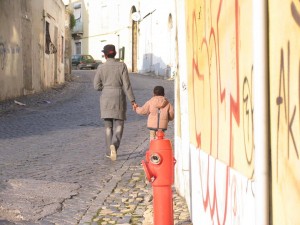
Lisbon shares with Paris the reputation of being the most African city in Europe. If the French capital’s distinction derives from the predominant number of former Francophone colonies on the continent, then the Portuguese case is far trickier – a combination of longevity (a 500 year presence on African soil), a history of settler colonialism (particularly in Angola) involving hundreds of thousands of migrants, and a lengthy, vicious and ‘late’ war waged against the anti-colonial movements in an attempt to keep hold of the country’s African “possessions.” In other words, a long history of blood – both shared and spilled.
Lisbon’s distinctive brand of ‘africanicity’ – in all of its subtleties, manifestations, and complexities – forms the nexus of enquiry for this research strand, which is divided into three principal areas of activity:
- black people. lisbon. A photographic investigation documenting aspects of the lived experience of predominantly African migrants, culminating in an exhibition and talk.
- OPEN MIND SESSIONS. A series of talks/performances by academics and practitioners. Each session will be inspired by a single thing – an artwork, a piece of music, a gesture in dance, etc. – and will invite us along on a magical and intellectual journey across time and space, making linkages with the cultures and histories of the Portuguese African diaspora. The talks are based on the idea that an open mind can see a whole universe in the tiniest object.
- LISBOA NA ÁFRICA (LISBON IN AFRICA). A sound documentary constructed around interviews with a range of Africa-based artists (including René Tavares, Kiluanji Kia Henda, Edson Pinheiro Chagas, and Kwame Sousa). Like migratory birds that transport seeds to and from far off places, these artists spend regular but varying degrees of time in Lisbon while basing themselves in their home countries. The question is, to what extent do these ‘seeds’ take root, blossom or bloom in order to fertilise the ‘soil’ of their home environments?
The principal investigator for the Lisboa: África na Europa research strand is Christabelle Peters, an academic researcher and creative writer with a background in photography, journalism, and media production. Currently, she holds a Leverhulme Early Career Fellowship in the Department of Hispanic Studies at the University of Warwick (UK), where she researches on the transnational cultural politics of identity in the anticolonial and postcolonial contexts of the Iberian Atlantic world.
Following on from the publication of her monograph entitled Cuban Identity and the Angolan Experience(Palgrave Macmillan, 2012), her new book project, Angola in the African Atlantic proposes an alternative paradigm to Paul Gilroy’s ‘black Atlantic’ for investigating race in Hispanic and Lusophone societies.
